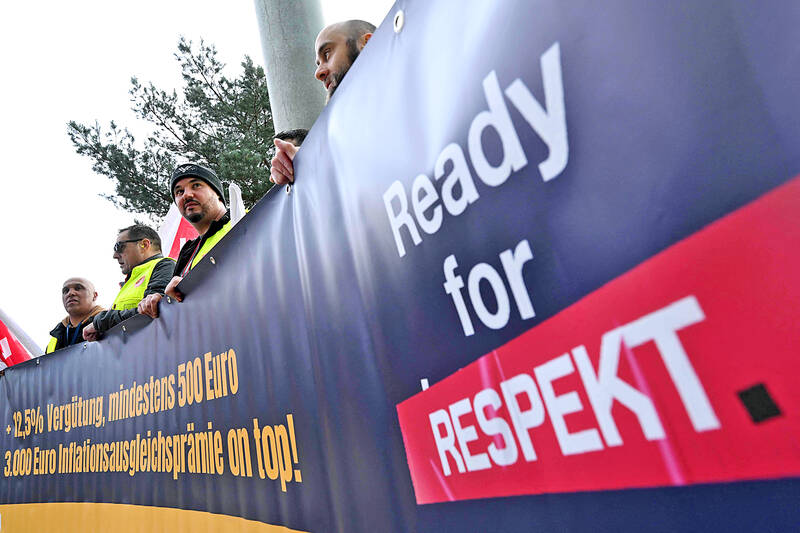Negotiated pay in the eurozone rose 4.5 percent at the end of last year, the European Central Bank (ECB) said yesterday, easing fears that rising salaries could sustain inflation above the target.
While still high, fourth-quarter pay growth is down from a eurozone record of 4.7 percent set in the previous three months, the ECB’s negotiated wage indicator showed.
The gauge — which signals possible pay pressures by crunching non-harmonized country data — had been more eagerly awaited than normal this time, as officials in Frankfurt, Germany, zero in on labor costs as a key factor in deciding when to cut interest rates.

Photo: AFP
However, many are even keener to see numbers for this quarter — due in May — before sanctioning a loosening of monetary policy.
“This slowing in wage growth at the end of last year should bring some relief that the feared wage-price spiral will not unfold in the eurozone,” said Carsten Brzeski, global head of macro at ING. However, “the ECB will definitely want to wait for first-quarter wage growth data before deciding on rate cuts. There’s no reason to change our call of a first cut in June.”
ECB President Christine Lagarde last week singled out salaries as “an increasingly important driver of inflation dynamics in the coming quarters,” while cautioning against “hasty decisions” on easing policy without assurance that price gains are headed back to the 2 percent target.
While a separate forward-looking ECB tracker of pay continues to signal strong pressures, agreements indicate some leveling off last quarter, Lagarde said.
In December last year, the ECB projected nominal wage growth would gradually decline to 3.3 percent in 2026 from 5.3 percent last year in terms of compensation per employee.
It expects pay increases to be limited as firms pass higher costs on to consumers at a slower pace.
However, while some officials see this happening, others — such as Austria’s Robert Holzmann — argues that companies are not likely to absorb rising wage bills.

Semiconductor business between Taiwan and the US is a “win-win” model for both sides given the high level of complementarity, the government said yesterday responding to tariff threats from US President Donald Trump. Home to the world’s largest contract chipmaker, Taiwan Semiconductor Manufacturing Co (TSMC, 台積電), Taiwan is a key link in the global technology supply chain for companies such as Apple Inc and Nvidia Corp. Trump said on Monday he plans to impose tariffs on imported chips, pharmaceuticals and steel in an effort to get the producers to make them in the US. “Taiwan and the US semiconductor and other technology industries

SMALL AND EFFICIENT: The Chinese AI app’s initial success has spurred worries in the US that its tech giants’ massive AI spending needs re-evaluation, a market strategist said Chinese artificial intelligence (AI) start-up DeepSeek’s (深度求索) eponymous AI assistant rocketed to the top of Apple Inc’s iPhone download charts, stirring doubts in Silicon Valley about the strength of the US’ technological dominance. The app’s underlying AI model is widely seen as competitive with OpenAI and Meta Platforms Inc’s latest. Its claim that it cost much less to train and develop triggered share moves across Asia’s supply chain. Chinese tech firms linked to DeepSeek, such as Iflytek Co (科大訊飛), surged yesterday, while chipmaking tool makers like Advantest Corp slumped on the potential threat to demand for Nvidia Corp’s AI accelerators. US stock

The US Federal Reserve is expected to announce a pause in rate cuts on Wednesday, as policymakers look to continue tackling inflation under close and vocal scrutiny from US President Donald Trump. The Fed cut its key lending rate by a full percentage point in the final four months of last year and indicated it would move more cautiously going forward amid an uptick in inflation away from its long-term target of 2 percent. “I think they will do nothing, and I think they should do nothing,” Federal Reserve Bank of St Louis former president Jim Bullard said. “I think the

SUBSIDIES: The nominee for commerce secretary indicated the Trump administration wants to put its stamp on the plan, but not unravel it entirely US President Donald Trump’s pick to lead the agency in charge of a US$52 billion semiconductor subsidy program declined to give it unqualified support, raising questions about the disbursement of funds to companies like Intel Corp and Taiwan Semiconductor Manufacturing Co (台積電). “I can’t say that I can honor something I haven’t read,” Howard Lutnick, Trump’s nominee for commerce secretary, said of the binding CHIPS and Science Act awards in a confirmation hearing on Wednesday. “To the extent monies have been disbursed, I would commit to rigorously enforcing documents that have been signed by those companies to make sure we get